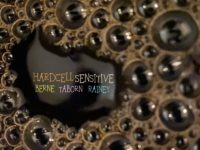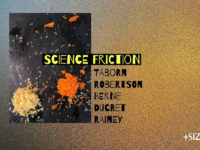by S. Victor Aaron
The credits scream “Tim Berne music” but the music itself more suggests “George Russell” or “Carla Bley.” This is the initial impression I got from Drew Gress’ newest offering released last month, The Irrational Numbers.
Modern jazz composer/bassist Drew Gress is one of those New York City “improvised music” cats that we’ve covered on this space with some regularity. One of his bass playing peers, William Parker, is a more recent member of that talented bunch to get spotlighted here. Gress himself has run around a lot in sax player Tim Berne’s crowd, in particular as a member of one of Berne’s numerous side projects, the whack jazz trio Paraphrase with drummer Tom Rainey.
Gress has led on some records of his own, and while I haven’t delved into any of them yet, the reputation of them—especially 2005’s Seven Black Butterflies—led me to try The Irrational Numbers as a jumping-in point.
But there were some other incentives as well: Gress’ old Paraphrase bandmates are on it, as well as pianist Craig Taborn. Which, in effect, makes this band Hard Cell plus Gress. Just as David Torn’s exquisite Prezens was “Hard Cell plus Torn.” And wouldn’t you know it, Torn is the co-producer on this album. How could I not like this record?
In reality, though, Drew Gress’ The Irrational Numbers seeks to strike a precarious balance between the heavily composed third stream jazz of Russell and the all-out free-from improvised music of Berne and his cohorts. Gress is also trying to showcase his own stand-up bass playing while still keeping the other players very much involved.
Drew does dabble in some electronic sounds as well; however, its use is barely noticeable and used only in spots, as opposed to that being central to the game plan of Torn’s Prezens.
Coming after the short, classical-minded introductory piece “Bellwether,” “Chevelle” has sharp melodic structures with subtle electronic effects percolating throughout. Solos sometimes come in tandem, such as Gress and Taborn improvising at the same time. The rollicking groove is interrupted by a softer interlude that introduces repeating figures all to way to the end. This track does it’s job in introducing concepts and tactics that are used again for the rest of the album and is perhaps the tightest composition of this entire group of songs.
On the next track Gress shows monster chops just underneath Berne’s fiery solo on “Your Favourite Kind.” Meanwhile, the main theme gradually comes into focus with Alessi’s trumpet and Berne eventually joins him. Taborn takes his turn at soloing and continues to do so for a while after the horns return to restate the theme.
“Fauxjobim” and “By Far” are the quieter standouts, with the former sounding more like Miles Davis’ wistful “Circles” than some highly composed piece while the latter is free-flowing and atmospheric; almost like an ECM recording. It’s a strangely beautiful piece.
“That Heavenly Hell” goes outside more than the other tracks. In a most interesting tactic, Gress solos with Alessi. This is immediately followed by Berne’s with Taborn’s simul-soloing, all while the rest of the band sits out. And then, Rainey comes crashing in, signalling a full-on free for all by all players before regrouping at the head once more.
The title of “Mas Relief” accurately suggests that the song is a reprieve from composed pieces in the form of a two minute a capella display of Gress’ highly lyrical acoustic bass.
“True South” meanders its way through varying melodic structures and tempos before a recognizable one comes into focus and finally ends with an interlude of electronic sounds that come to the forefront for the first time. It’s also the last time, as the album ends on that very interlude.
Drew Gress had set some pretty lofty goals with The Irrational Numbers. The ambitions aren’t met in every instance because the goals are sometimes incompatible, but it makes for a lot of interesting moments. Interesting enough to entice me to peruse his back catalog, at the least.
- Claudio Scolari Project – ‘Opera 8’ (2024) - April 25, 2024
- Nick Millevoi – ‘Moon Pulses’ (2024) - April 23, 2024
- Cannonball Adderley – ‘Poppin’ in Paris: Live at L’Olympia 1972′ (2024) - April 20, 2024




